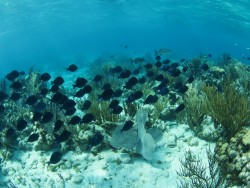News
CCMI's next Reef Lecture: 25th June 2019

The Central Caribbean Marine Institute (CCMI) is hosting the next event in the 2019 Reef Lecture series on Tuesday, 25th June at the National Gallery of the Cayman Islands. The topic for the evening will be ‘Important Fish on the Reef: What do you Think?’, presented by Dr. Claire Dell. For the past two years, Dr. Dell has been the primary researcher in a Darwin Plus Initiative funded project looking at the key herbivores on the reef, as herbivory is a critical process in maintaining and promoting reef health.
A unique part of this lecture event is that Dr. Dell is eager to solicit feedback from the attendees, both about their experiences in the past on the reefs and what they think needs to happen to safeguard local reefs in the future.
“I'm really looking forward to hearing about the experiences residents and Caymanians have had on the reef over the past 20 years and also what the community wants to see for the reef over the next 20 years,” states Dr. Dell. “My hope is that we can discuss this and together create a plan for rebuilding the reef.”
Dr. Dell, who has worked as a Research Scientist with CCMI in Little Cayman since August 2017, will also continue with additional field work for her research whilst in Grand Cayman on this visit. She will be collecting samples, conducting reef surveys and meeting with the Department of Environment, one of the project partners.
The Reef Lecture on Tuesday, 25th June will begin at 5:45 pm, and there will be an opportunity to ask questions at the end. This event is free and open to the public. Registration is requested at: https://donate.reefresearch.org/importantreeffish.
The Healthy Reefs campaign, which includes all Reef Lecture events, is supported by Ogier, Foster’s Food Fair IGA, Aureum Re, and the Cayman Islands Department of Tourism. The National Gallery of the Cayman Islands continues to be an amazing partner in hosting important public events such as the Reef Lecture series.
For more information about CCMI, Healthy Reefs, upcoming events and how to help protect our reefs, visit www.reefresearch.org.












